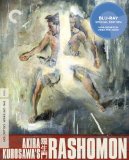| Reviews & Columns |
|
Reviews DVD TV on DVD Blu-ray 4K UHD International DVDs In Theaters Reviews by Studio Video Games Features Collector Series DVDs Easter Egg Database Interviews DVD Talk Radio Feature Articles Columns Anime Talk DVD Savant Horror DVDs The M.O.D. Squad Art House HD Talk Silent DVD
|
DVD Talk Forum |
|
|
| Resources |
|
DVD Price Search Customer Service #'s RCE Info Links |
|
Columns
|
|
|
Rashomon: The Criterion Collection
The Criterion Collection // Unrated // November 6, 2012
List Price: $39.95 [Buy now and save at Amazon]
The Film:
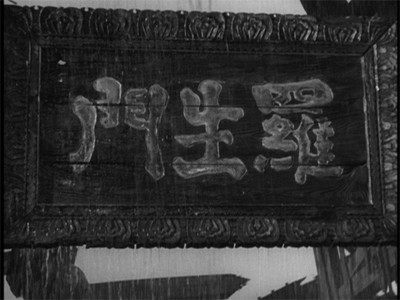 Modern civilization is constantly evolving how it handles perspectives on what's real -- on social, political, and ideological levels. Grasping and valuing alternate viewpoints, both the pros and the cons, will persevere as long as we continue to move forward, but with that understanding, though, comes the pitfalls of examining all sides of the coin: unearthing dishonesty, conniving agendas, and the development of bias based on recognized viewpoints. That might sound a bit expansive in scope when looking at Akira Kurosawa's Rashomon, the director's ninety-minute, relatively straightforward depiction of differing outlooks on a murder through alternating witnesses, yet it cleverly touches on all these points by thriving as a versatile and challenging parable, about humanity's tendency to construct outlooks based on their own personal schemas. It holds the capacity to make one question the accuracy of what they believe, ponder their biases, and contemplate whether there's truth in their opposition.
Modern civilization is constantly evolving how it handles perspectives on what's real -- on social, political, and ideological levels. Grasping and valuing alternate viewpoints, both the pros and the cons, will persevere as long as we continue to move forward, but with that understanding, though, comes the pitfalls of examining all sides of the coin: unearthing dishonesty, conniving agendas, and the development of bias based on recognized viewpoints. That might sound a bit expansive in scope when looking at Akira Kurosawa's Rashomon, the director's ninety-minute, relatively straightforward depiction of differing outlooks on a murder through alternating witnesses, yet it cleverly touches on all these points by thriving as a versatile and challenging parable, about humanity's tendency to construct outlooks based on their own personal schemas. It holds the capacity to make one question the accuracy of what they believe, ponder their biases, and contemplate whether there's truth in their opposition.
Naturally, those are the broader elements to take away from Kurosawa's work, discovered after letting the material digest alongside some soul-searching and scrutiny. On the surface, the story begins under the the rainfall-submerged roof of Rashomon Gate, where two sorrowful men -- a common woodcutter (Takashi Shimura) and a priest (Minoru Chiaki) -- recall the day's events of a murder/rape trial to a snide commoner, mostly to get an outside perspective. Aghast from the lack of humanity they've witnessed, they explain exactly what happened in the courtyard: after the woodcutter, who discovered the body of a murdered noble samurai (Masayuki Mori), offers his testimony to the court, they overhear the position and defense of those involved in the crime. The murder suspect, Tajômaru (Toshiro Mifune), a notorious womanizing bandit, paints one picture; the noble lord's wife (Machiko Kyō), who succumbed to Tajômaru's wiles, paints a very different picture. Some details remain the same, but the motives and mentalities of those involved differ drastically. And then, other testimonies emerge.
One of Rashomon's constants is the setting, the deep, shadowy woods -- captured through Kazuo Miyagawa's photographic eye -- where the murder takes place. Kurosawa creates an obscured forested maze that's almost separated from reality, existing in this space where truth and lies slip between the shadows cast by the trees and branches, catering to the devices of those passing through. The lighting created by those shadows doesn't just achieve an inclusive geographical effect, though, as the shades of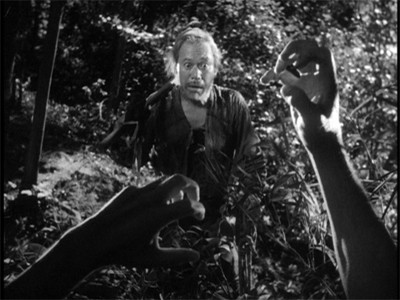 light bathing the characters project virtuous, emotionally chilly, damaged, and corrupted moods on those involved. The effects are occasionally subtle; Tajômaru laying against the stump of a sun-covered tree makes the murderous bandit appear innocent and free of premeditation, while the scornful look of the noble samurai upon his mischievous wife frames him as unfeeling and contemptuous. Perhaps the elements bathed in direct sunlight reflect on the truth, since those rays come from a source outside the convoluted maze. Or, perhaps the shadowed elements indicate the truths clouded in the recollection.
light bathing the characters project virtuous, emotionally chilly, damaged, and corrupted moods on those involved. The effects are occasionally subtle; Tajômaru laying against the stump of a sun-covered tree makes the murderous bandit appear innocent and free of premeditation, while the scornful look of the noble samurai upon his mischievous wife frames him as unfeeling and contemptuous. Perhaps the elements bathed in direct sunlight reflect on the truth, since those rays come from a source outside the convoluted maze. Or, perhaps the shadowed elements indicate the truths clouded in the recollection.
That's one of the brilliant, thought-probing things about Rashomon: there's no comprehensive truth or ironclad solution to the puzzle (even though it reveals a recount that's, presumably, very close, the origin of the idiom "Rashomon Effect"), which demands the audience to interpret based on the perspective of those flawed souls painting their own pictures. Kurosawa masterfully prevents the audience from seeing anything outside the viewpoint of the person telling their particular side of the story, which continues the illusion that it's purely their telling being observed, enriching the idea that they're glorifying elements that reinforce the storyteller's motives -- a desire to save face, to appear righteous or a victim, or to demonize the opposition. Acts of self-defense and surrender to power on one side of the coin instead appear as acts of desperation and cunning on the other, while grand sword duels appear as clumsy non-battles and rape turns into consensual activity. A rough, obscured fracas of activity is all that's left for the audience to filter, a jumble of facts and fallacies that bury the truth underneath.
Because of this, Rashomon contains roughly triple or quadruple the characters that it appears to have at a cursory glance, since each spin on the events harbors its own tweaked versions of how they appear in the eyes of the teller. Tajômaru, craftily and almost unrecognizably played by Toshiro Mifune, exhibits a gradient of wily, abrasive mannerisms as the bandit; he's relatively civil and pragmatic in one form, then vicious and unruly in the other. Machiko Kyō transforms from a fiery and salacious wife to a dutiful martyr with grace, then back again, while Masayuki Mori's steely gazes ever-so-slightly shift from suspicion to scorn and discontent while he's restrained and witnessing the events before his eyes. What's compelling about these versions isn't that they vary, but that they're actually expressions of the individual storytellers, galvanized by how the teller would like to be seen while misrepresenting -- at least, to a little -- the other side in a way that'll appear less-appealing to those who control their fate. You only see the real people very briefly in the film; the rest are manifested from biased standpoints.
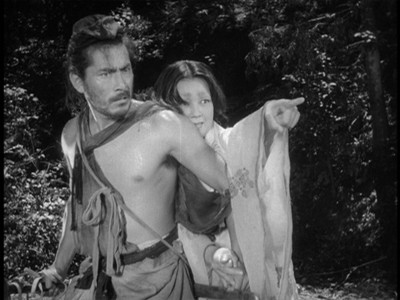 True "honesty" about the events in the forest, free of unreliable narration, only exists in the courtyard during the trial while the testimonials are spun, the witnesses' mannerisms observed in the eyes of a judge and jury. As presented by Kurosawa by doing a little breaking of the fourth wall, the audience members themselves actually become that judge and jury, and the only thing that can be truly relied on throughout Rashomon is internal evaluation of honesty. That's how it becomes a philosophical work of art: the spinning of stories, and the moral relativity of contorting details, turns a critical eye on any venue where raw facts are tailored to better suit the agendas of speakers. Kurosawa and co-writer Shinobu Hashimoto, working off two short stories from Ryūnosuke Akutagawa, don't have to explicitly discuss the rat race of politics or the moral grayness of military tactics in their script to provide a critique on their detail-contorting foundations. They only need to underscore the human dilemma, and it leaves the rest to us.
True "honesty" about the events in the forest, free of unreliable narration, only exists in the courtyard during the trial while the testimonials are spun, the witnesses' mannerisms observed in the eyes of a judge and jury. As presented by Kurosawa by doing a little breaking of the fourth wall, the audience members themselves actually become that judge and jury, and the only thing that can be truly relied on throughout Rashomon is internal evaluation of honesty. That's how it becomes a philosophical work of art: the spinning of stories, and the moral relativity of contorting details, turns a critical eye on any venue where raw facts are tailored to better suit the agendas of speakers. Kurosawa and co-writer Shinobu Hashimoto, working off two short stories from Ryūnosuke Akutagawa, don't have to explicitly discuss the rat race of politics or the moral grayness of military tactics in their script to provide a critique on their detail-contorting foundations. They only need to underscore the human dilemma, and it leaves the rest to us.
Rashomon doesn't really need an exclamation point at the end to reinforce those points it's making, but, alas, Kurosawa's diligent ambition disagrees. Everything that that the woodcutter and priest illustrate across their tale-telling comes to a head in a climactic lynchpin, shifting the film's perception from the pure nature of dishonesty -- "It's human to lie. Most of the time we can't even be honest to ourselves." -- to what humans do when they're aware of the moral indignity of others. Ultimately, the conclusion admirably shrugs off a direct nihilistic outlook on placing faith in others, even with the awareness of corruption, profiteering, and underhandedness of other at the forefront. Instead, on a day caught in a torrent of human ugliness, it ends with a gesture of redemption and restoration of faith in one of mankind's flawed souls, capping off what's arguable Akira Kurosawa's finest picture in this cautionary examination of reality with assurance that not everyone needs to be seen through the lens of suspicion. Just, some do.
The Blu-ray:
The striking image of Tajômaru in a lovely, colorful design adorns the front of The Criterion Collection's Blu-ray upgrade for Rashomon, which comes in their standard clear-case presentation featuring inner artwork that shares the appearance of deep-red wood panels. On the front of the Booklet lies a sketch similar to that of the front image, the first of a handful to appear throughout. Ryūnosuke Akutagawa's Short Stories have been replicated, as has Stephen Prince's essay "The Rashomon Effect" and the excerpt from "Akira Kurosawa on Rashomon".
Video and Audio:
Expectations perhaps ran a little high for The Criterion Collection's Blu-ray presentation of Rashomon, given that it recently underwent a substantial restoration in '08 by the Academy Film Archive, so it's slightly disappointing to see this largely-marvelous treatment hampered by a few inherent, uncontrollable flaws. Oh, the 1.33:1-framed 1080p image is occasionally quite impressive: derived from a print lifted from the original camera negative in 1962 and scanned at 4K resolution, then cleaned up at 2K, several close-ups reveal a staggering amount of detail, depth, and brilliant handling of contrast. Other shots aren't as radiant; hefty grain and fine but noticeable print scuffs mar what's ultimately a splendid shot, while a slight haze and image jittering can be spotted at times. These instances are much fewer and far between, though, and the treatment maintains a few consistent themes: exceptional dimensionality, balanced yet deep contrast, and a natural film grain that's stunning. The uptick in quality is, by and large, beyond substantial and satisfying.
The same impressions befall the monaural treatment, mostly derived from the '60s fine-grain positive, which navigates the unavoidable flaws in the track's age with grace and acuity. Again, the inherent limitations of the source shackle the sonic presentation from truly excelling; the music and dialogue can sound a tad thin and raspy, while achieving silence is rare in the quieter sequences due to a low, persistent hiss. With that in mind, the balance and control here is often also rather impressive, allowing Fumio Hayasaka's music to obtain a throaty bass profile and gripping mid-range flutters that excel beyond the DVD's aural presentation. Rainfall trickles with suppressed but sharp brevity, thunder achieves a convincing rumble, and the sounds of swords skidding along the dusty, leafy environment in the woods is surprisingly tangible. The English subtitles are, of course, an excellent translation.
Special Features:
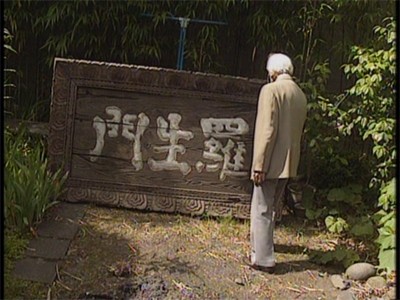 The Criterion Collection have largely stuck to the supplemental features available on their original DVD presentation of Rashomon, along with a few additions cherry-picked from other sources, front and center remaining the Commentary with Donald Richie that's been alive and kicking since the 2002 release. Insightful, analytical, and quite knowledgeable of Kurosawa's catalogue and themes, Richie blends following along with the plot with anecdotes and factoids in a pleasant manner -- if a bit perfunctory. The forward from Robert Altman on Rashomon (6:31, HD) also makes an appearance, where the director cites the film and Kurosawa's technique as a vivid influence on his work, as well as the excerpts from The World of Kazuo Miyagawa (12:34, HD) that feature interviews with the cinematographer, Kurosawa, and others. Rounding out the familiar features is the original Theatrical Trailer (3:58, HD).
The Criterion Collection have largely stuck to the supplemental features available on their original DVD presentation of Rashomon, along with a few additions cherry-picked from other sources, front and center remaining the Commentary with Donald Richie that's been alive and kicking since the 2002 release. Insightful, analytical, and quite knowledgeable of Kurosawa's catalogue and themes, Richie blends following along with the plot with anecdotes and factoids in a pleasant manner -- if a bit perfunctory. The forward from Robert Altman on Rashomon (6:31, HD) also makes an appearance, where the director cites the film and Kurosawa's technique as a vivid influence on his work, as well as the excerpts from The World of Kazuo Miyagawa (12:34, HD) that feature interviews with the cinematographer, Kurosawa, and others. Rounding out the familiar features is the original Theatrical Trailer (3:58, HD).
While the folks at Criterion haven't assembled any new features for this disc, they have hunted down a few fresh pieces not available on the previous DVD. Notably, we've got a lengthy, in-depth collection of interviews entitled A Testimony as an Image (1:08:22, SD). Script supervisor Teruyo Nogami sits down with co-writer Shinobu Hashimoto, assistant director Tokuzo Tanaka, and a series of others for casual but pleasing interviews, while a large roundtable-style discussion with a hefty amount of the cast and crew fits in the center. A few production photos occasionally break up the chatter, which remains quite involving as they explore their experiences. Also, Criterion have stumbled onto a really neat fine: an audio Interview with Takashi Shimura (16:03) from '61, conducted by writer/critic Gideon Bachmann and translated by Donald Richie himself at the Berlin Film Festival. Finally, a second Trailer (1:50, HD) for the re-release of Rashomon can be found following the original trailer.
Final Thoughts:
Look, I'm going to keep this relatively short and simple: Akira Kurosawa's Rashomon was my first exposure to the great director's catalogue, and, acknowledging a little tug-of-war with Throne of Blood every now and then, remains my favorite after many, many years of discovering more of his work. It's a parable on humanity's dishonesty and our ability to view and contort details to better suit our viewpoints, disregarding whether it tears others down or enters into morally-repugnant territory -- and no matter the time period, that critique will always remains relevant. Even on the surface, it's fascinating to just watch these starkly-different takes on the same event as they unfold, with every twig in place to retain the illusion, every shot lingering just long enough, and beat of drama or thematic context hitting right when it's needed. Frankly, it's about as perfect as cinema gets. The Criterion Collection's Blu-ray is a phenomenal piece of work, too, sporting recently-remastered audiovisual properties and a comprehensive slate of new and old special features. Anything below DVDTalk's Collector's Series simply wouldn't make sense.
Note: Screenshots in this review are from Criterion's 2002 DVD, and do not represent the Blu-ray under review here.
Thomas Spurlin, Staff Reviewer -- DVDTalk Reviews | Personal Blog/Site
 Modern civilization is constantly evolving how it handles perspectives on what's real -- on social, political, and ideological levels. Grasping and valuing alternate viewpoints, both the pros and the cons, will persevere as long as we continue to move forward, but with that understanding, though, comes the pitfalls of examining all sides of the coin: unearthing dishonesty, conniving agendas, and the development of bias based on recognized viewpoints. That might sound a bit expansive in scope when looking at Akira Kurosawa's Rashomon, the director's ninety-minute, relatively straightforward depiction of differing outlooks on a murder through alternating witnesses, yet it cleverly touches on all these points by thriving as a versatile and challenging parable, about humanity's tendency to construct outlooks based on their own personal schemas. It holds the capacity to make one question the accuracy of what they believe, ponder their biases, and contemplate whether there's truth in their opposition.
Modern civilization is constantly evolving how it handles perspectives on what's real -- on social, political, and ideological levels. Grasping and valuing alternate viewpoints, both the pros and the cons, will persevere as long as we continue to move forward, but with that understanding, though, comes the pitfalls of examining all sides of the coin: unearthing dishonesty, conniving agendas, and the development of bias based on recognized viewpoints. That might sound a bit expansive in scope when looking at Akira Kurosawa's Rashomon, the director's ninety-minute, relatively straightforward depiction of differing outlooks on a murder through alternating witnesses, yet it cleverly touches on all these points by thriving as a versatile and challenging parable, about humanity's tendency to construct outlooks based on their own personal schemas. It holds the capacity to make one question the accuracy of what they believe, ponder their biases, and contemplate whether there's truth in their opposition. Naturally, those are the broader elements to take away from Kurosawa's work, discovered after letting the material digest alongside some soul-searching and scrutiny. On the surface, the story begins under the the rainfall-submerged roof of Rashomon Gate, where two sorrowful men -- a common woodcutter (Takashi Shimura) and a priest (Minoru Chiaki) -- recall the day's events of a murder/rape trial to a snide commoner, mostly to get an outside perspective. Aghast from the lack of humanity they've witnessed, they explain exactly what happened in the courtyard: after the woodcutter, who discovered the body of a murdered noble samurai (Masayuki Mori), offers his testimony to the court, they overhear the position and defense of those involved in the crime. The murder suspect, Tajômaru (Toshiro Mifune), a notorious womanizing bandit, paints one picture; the noble lord's wife (Machiko Kyō), who succumbed to Tajômaru's wiles, paints a very different picture. Some details remain the same, but the motives and mentalities of those involved differ drastically. And then, other testimonies emerge.
One of Rashomon's constants is the setting, the deep, shadowy woods -- captured through Kazuo Miyagawa's photographic eye -- where the murder takes place. Kurosawa creates an obscured forested maze that's almost separated from reality, existing in this space where truth and lies slip between the shadows cast by the trees and branches, catering to the devices of those passing through. The lighting created by those shadows doesn't just achieve an inclusive geographical effect, though, as the shades of
 light bathing the characters project virtuous, emotionally chilly, damaged, and corrupted moods on those involved. The effects are occasionally subtle; Tajômaru laying against the stump of a sun-covered tree makes the murderous bandit appear innocent and free of premeditation, while the scornful look of the noble samurai upon his mischievous wife frames him as unfeeling and contemptuous. Perhaps the elements bathed in direct sunlight reflect on the truth, since those rays come from a source outside the convoluted maze. Or, perhaps the shadowed elements indicate the truths clouded in the recollection.
light bathing the characters project virtuous, emotionally chilly, damaged, and corrupted moods on those involved. The effects are occasionally subtle; Tajômaru laying against the stump of a sun-covered tree makes the murderous bandit appear innocent and free of premeditation, while the scornful look of the noble samurai upon his mischievous wife frames him as unfeeling and contemptuous. Perhaps the elements bathed in direct sunlight reflect on the truth, since those rays come from a source outside the convoluted maze. Or, perhaps the shadowed elements indicate the truths clouded in the recollection. That's one of the brilliant, thought-probing things about Rashomon: there's no comprehensive truth or ironclad solution to the puzzle (even though it reveals a recount that's, presumably, very close, the origin of the idiom "Rashomon Effect"), which demands the audience to interpret based on the perspective of those flawed souls painting their own pictures. Kurosawa masterfully prevents the audience from seeing anything outside the viewpoint of the person telling their particular side of the story, which continues the illusion that it's purely their telling being observed, enriching the idea that they're glorifying elements that reinforce the storyteller's motives -- a desire to save face, to appear righteous or a victim, or to demonize the opposition. Acts of self-defense and surrender to power on one side of the coin instead appear as acts of desperation and cunning on the other, while grand sword duels appear as clumsy non-battles and rape turns into consensual activity. A rough, obscured fracas of activity is all that's left for the audience to filter, a jumble of facts and fallacies that bury the truth underneath.
Because of this, Rashomon contains roughly triple or quadruple the characters that it appears to have at a cursory glance, since each spin on the events harbors its own tweaked versions of how they appear in the eyes of the teller. Tajômaru, craftily and almost unrecognizably played by Toshiro Mifune, exhibits a gradient of wily, abrasive mannerisms as the bandit; he's relatively civil and pragmatic in one form, then vicious and unruly in the other. Machiko Kyō transforms from a fiery and salacious wife to a dutiful martyr with grace, then back again, while Masayuki Mori's steely gazes ever-so-slightly shift from suspicion to scorn and discontent while he's restrained and witnessing the events before his eyes. What's compelling about these versions isn't that they vary, but that they're actually expressions of the individual storytellers, galvanized by how the teller would like to be seen while misrepresenting -- at least, to a little -- the other side in a way that'll appear less-appealing to those who control their fate. You only see the real people very briefly in the film; the rest are manifested from biased standpoints.
 True "honesty" about the events in the forest, free of unreliable narration, only exists in the courtyard during the trial while the testimonials are spun, the witnesses' mannerisms observed in the eyes of a judge and jury. As presented by Kurosawa by doing a little breaking of the fourth wall, the audience members themselves actually become that judge and jury, and the only thing that can be truly relied on throughout Rashomon is internal evaluation of honesty. That's how it becomes a philosophical work of art: the spinning of stories, and the moral relativity of contorting details, turns a critical eye on any venue where raw facts are tailored to better suit the agendas of speakers. Kurosawa and co-writer Shinobu Hashimoto, working off two short stories from Ryūnosuke Akutagawa, don't have to explicitly discuss the rat race of politics or the moral grayness of military tactics in their script to provide a critique on their detail-contorting foundations. They only need to underscore the human dilemma, and it leaves the rest to us.
True "honesty" about the events in the forest, free of unreliable narration, only exists in the courtyard during the trial while the testimonials are spun, the witnesses' mannerisms observed in the eyes of a judge and jury. As presented by Kurosawa by doing a little breaking of the fourth wall, the audience members themselves actually become that judge and jury, and the only thing that can be truly relied on throughout Rashomon is internal evaluation of honesty. That's how it becomes a philosophical work of art: the spinning of stories, and the moral relativity of contorting details, turns a critical eye on any venue where raw facts are tailored to better suit the agendas of speakers. Kurosawa and co-writer Shinobu Hashimoto, working off two short stories from Ryūnosuke Akutagawa, don't have to explicitly discuss the rat race of politics or the moral grayness of military tactics in their script to provide a critique on their detail-contorting foundations. They only need to underscore the human dilemma, and it leaves the rest to us. Rashomon doesn't really need an exclamation point at the end to reinforce those points it's making, but, alas, Kurosawa's diligent ambition disagrees. Everything that that the woodcutter and priest illustrate across their tale-telling comes to a head in a climactic lynchpin, shifting the film's perception from the pure nature of dishonesty -- "It's human to lie. Most of the time we can't even be honest to ourselves." -- to what humans do when they're aware of the moral indignity of others. Ultimately, the conclusion admirably shrugs off a direct nihilistic outlook on placing faith in others, even with the awareness of corruption, profiteering, and underhandedness of other at the forefront. Instead, on a day caught in a torrent of human ugliness, it ends with a gesture of redemption and restoration of faith in one of mankind's flawed souls, capping off what's arguable Akira Kurosawa's finest picture in this cautionary examination of reality with assurance that not everyone needs to be seen through the lens of suspicion. Just, some do.
The Blu-ray:
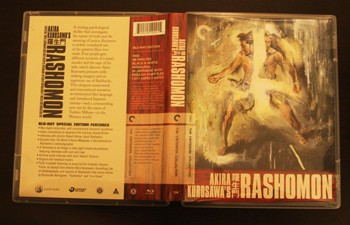 | 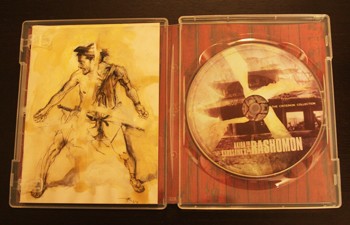 |
The striking image of Tajômaru in a lovely, colorful design adorns the front of The Criterion Collection's Blu-ray upgrade for Rashomon, which comes in their standard clear-case presentation featuring inner artwork that shares the appearance of deep-red wood panels. On the front of the Booklet lies a sketch similar to that of the front image, the first of a handful to appear throughout. Ryūnosuke Akutagawa's Short Stories have been replicated, as has Stephen Prince's essay "The Rashomon Effect" and the excerpt from "Akira Kurosawa on Rashomon".
Video and Audio:
Expectations perhaps ran a little high for The Criterion Collection's Blu-ray presentation of Rashomon, given that it recently underwent a substantial restoration in '08 by the Academy Film Archive, so it's slightly disappointing to see this largely-marvelous treatment hampered by a few inherent, uncontrollable flaws. Oh, the 1.33:1-framed 1080p image is occasionally quite impressive: derived from a print lifted from the original camera negative in 1962 and scanned at 4K resolution, then cleaned up at 2K, several close-ups reveal a staggering amount of detail, depth, and brilliant handling of contrast. Other shots aren't as radiant; hefty grain and fine but noticeable print scuffs mar what's ultimately a splendid shot, while a slight haze and image jittering can be spotted at times. These instances are much fewer and far between, though, and the treatment maintains a few consistent themes: exceptional dimensionality, balanced yet deep contrast, and a natural film grain that's stunning. The uptick in quality is, by and large, beyond substantial and satisfying.
The same impressions befall the monaural treatment, mostly derived from the '60s fine-grain positive, which navigates the unavoidable flaws in the track's age with grace and acuity. Again, the inherent limitations of the source shackle the sonic presentation from truly excelling; the music and dialogue can sound a tad thin and raspy, while achieving silence is rare in the quieter sequences due to a low, persistent hiss. With that in mind, the balance and control here is often also rather impressive, allowing Fumio Hayasaka's music to obtain a throaty bass profile and gripping mid-range flutters that excel beyond the DVD's aural presentation. Rainfall trickles with suppressed but sharp brevity, thunder achieves a convincing rumble, and the sounds of swords skidding along the dusty, leafy environment in the woods is surprisingly tangible. The English subtitles are, of course, an excellent translation.
Special Features:
 The Criterion Collection have largely stuck to the supplemental features available on their original DVD presentation of Rashomon, along with a few additions cherry-picked from other sources, front and center remaining the Commentary with Donald Richie that's been alive and kicking since the 2002 release. Insightful, analytical, and quite knowledgeable of Kurosawa's catalogue and themes, Richie blends following along with the plot with anecdotes and factoids in a pleasant manner -- if a bit perfunctory. The forward from Robert Altman on Rashomon (6:31, HD) also makes an appearance, where the director cites the film and Kurosawa's technique as a vivid influence on his work, as well as the excerpts from The World of Kazuo Miyagawa (12:34, HD) that feature interviews with the cinematographer, Kurosawa, and others. Rounding out the familiar features is the original Theatrical Trailer (3:58, HD).
The Criterion Collection have largely stuck to the supplemental features available on their original DVD presentation of Rashomon, along with a few additions cherry-picked from other sources, front and center remaining the Commentary with Donald Richie that's been alive and kicking since the 2002 release. Insightful, analytical, and quite knowledgeable of Kurosawa's catalogue and themes, Richie blends following along with the plot with anecdotes and factoids in a pleasant manner -- if a bit perfunctory. The forward from Robert Altman on Rashomon (6:31, HD) also makes an appearance, where the director cites the film and Kurosawa's technique as a vivid influence on his work, as well as the excerpts from The World of Kazuo Miyagawa (12:34, HD) that feature interviews with the cinematographer, Kurosawa, and others. Rounding out the familiar features is the original Theatrical Trailer (3:58, HD). While the folks at Criterion haven't assembled any new features for this disc, they have hunted down a few fresh pieces not available on the previous DVD. Notably, we've got a lengthy, in-depth collection of interviews entitled A Testimony as an Image (1:08:22, SD). Script supervisor Teruyo Nogami sits down with co-writer Shinobu Hashimoto, assistant director Tokuzo Tanaka, and a series of others for casual but pleasing interviews, while a large roundtable-style discussion with a hefty amount of the cast and crew fits in the center. A few production photos occasionally break up the chatter, which remains quite involving as they explore their experiences. Also, Criterion have stumbled onto a really neat fine: an audio Interview with Takashi Shimura (16:03) from '61, conducted by writer/critic Gideon Bachmann and translated by Donald Richie himself at the Berlin Film Festival. Finally, a second Trailer (1:50, HD) for the re-release of Rashomon can be found following the original trailer.
Final Thoughts:
Look, I'm going to keep this relatively short and simple: Akira Kurosawa's Rashomon was my first exposure to the great director's catalogue, and, acknowledging a little tug-of-war with Throne of Blood every now and then, remains my favorite after many, many years of discovering more of his work. It's a parable on humanity's dishonesty and our ability to view and contort details to better suit our viewpoints, disregarding whether it tears others down or enters into morally-repugnant territory -- and no matter the time period, that critique will always remains relevant. Even on the surface, it's fascinating to just watch these starkly-different takes on the same event as they unfold, with every twig in place to retain the illusion, every shot lingering just long enough, and beat of drama or thematic context hitting right when it's needed. Frankly, it's about as perfect as cinema gets. The Criterion Collection's Blu-ray is a phenomenal piece of work, too, sporting recently-remastered audiovisual properties and a comprehensive slate of new and old special features. Anything below DVDTalk's Collector's Series simply wouldn't make sense.
|
| Popular Reviews |
| Sponsored Links |
|
|
| Sponsored Links |
|
|
| Release List | Reviews | Shop | Newsletter | Forum | DVD Giveaways | Blu-Ray | Advertise |
|
Copyright 2024 DVDTalk.com All Rights Reserved. Legal Info, Privacy Policy, Terms of Use,
Manage Preferences,
Your Privacy Choices | |||||||









